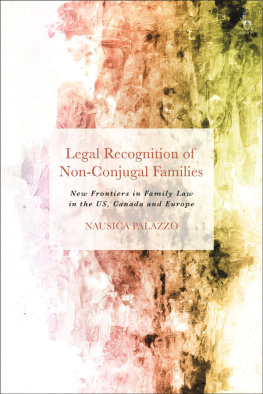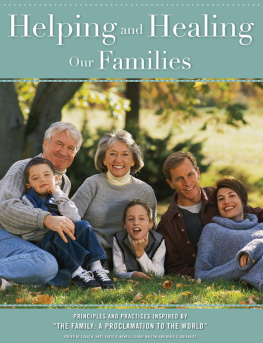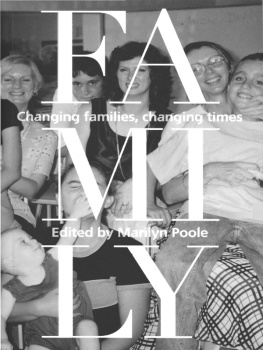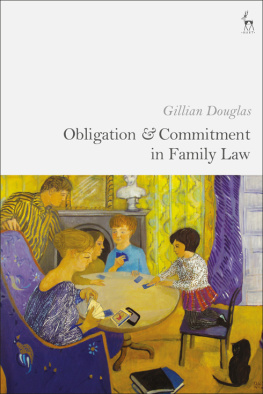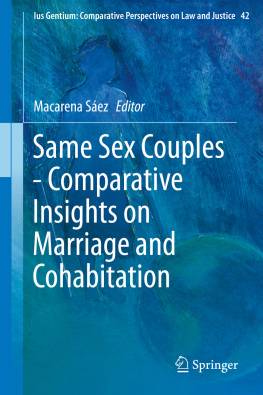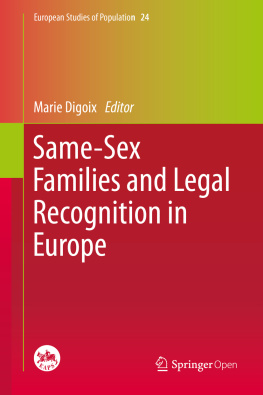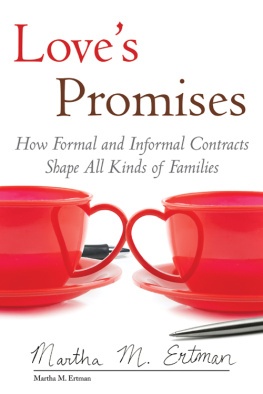CONTENTS

LEGAL RECOGNITION OF NON-CONJUGAL FAMILIES
The insufficient recognition of new families is a legal problem that needs fixing in light of recent evolutions in family structures and norms. While Western jurisdictions retain marriage as the key referent for social policies, people increasingly form familiar bonds outside of marriage (such as non-conjugal unions, polyamorous relationships, and various religion-based families).
focuses on courtroom litigation on the basis that courts nowadays are central avenues of social change. It takes non-conjugal families as a case study and provides an analysis of the most compelling argumentative strategies that non-conjugal families can mobilise in Canada and the US, the EU and before the European Court of Human Rights.
Through its comparative, interdisciplinary and critical legal method, aiming at predicting the approach jurisdictions are set to take and the hindrances thereof to overcome, this book provides scholars, activists and policymakers with key conceptual tools to tackle the current invisibility of all new families.
Legal Recognition
of Non-Conjugal Families
New Frontiers in Family Law in the US,
Canada and Europe
Nausica Palazzo

Issues of care and intimacy found a new lease of life during the COVID-19 pandemic. For most people, reciprocal care meant survival, both physical and mental. Needless to say, a sense of overwhelming vulnerability blew over human populations across continents. This occurred to the dismay of many in the rich West, who had encountered that kind of structural, cross-sectional vulnerability much less often, compared to populations in other parts of the world. Neoliberalism only had concealed this inherent feature of human life under the carpet of an energising individualism.
The pandemic conjured up a second, strictly related issue: that of who is family to us. I spent my quarantine in Italy, the Western country where it hit first with incommensurable potency. I stared speechless at the most dramatic moments occurring in succession on TV and for weeks I had nothing to say, let alone write, in the face of all that suffering. In April, nearly one month after the national lockdown was declared, something unusual occurred. The Italian government announced the end of the harshest version of the lockdown and the beginning of what most countries tagged as phase 2. Starting on 4 May 2020, we could exit our lairs to meet at a one-metre distance our family.
However, the initial definition of family was met with resistance, as it was entirely based on blood and legal ties. It covered persons as far away from us as uncles and cousins of ones husband/wife, while falling short of accounting for a plethora of relationships of the utmost significance to us. The ensuing debate only resulted in an extension of the relevant definition to cover the sexual partner in a durable relationship, a mythological relationship whose durability the police had no possibility whatsoever to ascertain due to privacy reasons. Yet, the category was there to convey the message that the stable sexual relationship is the only acceptable exception to an understanding of family based on blood or legal ties.
Then, the debate on national media outlets took an unexpected twist. Some voices ventured asking whether we should take family to mean something else, such as an extended family of friends or a family of choice (elective family).to the material and emotional support of some others, despite these persons not necessarily falling within the accepted meanings of family. Also, if we were to put ourselves back on our feet, it was imperative to interact with those we cared for the most and who would most likely help us do that.
The lockdown easily became a metaphor for life, meaning that most of us only get to navigate our way through life by means of the support of persons positioning themselves outside state-sponsored family definitions. This applied to some of the most vulnerable categories in society think of a transgender person repudiated by her parents who found support in a mutual aid group but in a sense to all of us, regardless of whether we identify with any such category.
Crucially, the gamut of relationships we enter throughout life is infinite, without some of us even knowing that some networks we create are so central to us that they deserve the family tag. Therefore, before addressing lawyers, sociologists and scholars from all disciplines, this book addresses persons whose imagination could not imagine. Its aim is to deepen understanding of the variety of ways in which we live family throughout life and of the possibility for expressions of choice to even gain legal recognition.
Trento,
6 June 2020
.
I have always had the feeling that I was exactly where I was supposed to be. This book is the result of intellectual encounters in all such places. The idea behind it comes from my doctoral dissertation, which I completed in Trento under the attentive, liberal and supportive supervision of Roberto Toniatti, to whom goes my deepest gratitude. Its focus has been refined over and over again through the invaluable support of colleagues and mentors at the universities where I have worked and studied. I especially wish to thank Giuseppe Franco Ferrari at Bocconi University for believing in this project, Luisa Antoniolli and Fulvio Cortese at the University of Trento, and Marco Ventura at Fondazione Bruno Kessler for patiently sharing their insights with me. Let me also thank Mathias Reimann and Robert Leckey: This book would simply not be the same without my stay in Montral and Ann Arbor and these lucky encounters.
Looking back, I am impressed by the enthusiasm that surrounded this book project and the help that I have received, most of which was simply unexpected, like the most beautiful gifts are. I am aware that I should not take it for granted and that I am indebted to each and every one of you. Let me start paying off the debt by thanking Brian Bird, Thomas Casadei, Donna Greshner, Francesco Palermo, Angelo Schillaci and Masuma Shahid for their comments on parts of this work. I am also grateful to Richard Albert, Beatrice Gusmano and Wendy Schrama for their leads, and Jonathan Herring, whose generous comments on my dissertation were critical when I had the reckless idea to convert it into a monograph. Further, let me thank Thomas McMorrow, whose thoughtful, patient and encouraging advice came at a time in which I needed it most, and Mariano Croce, whose person and work is a true inspiration to me.
Ultimately, I wish to thank my family, which has been there in the harshest times where a broken leg and a pandemic seemed to stand in the way of the completion of this book. You are my favourite gift.
Canada
| Alberta v Hutterian Brethren of Wilson Colony [2009] 2 SCR 567 |
| Andrews v Law Society of British Columbia [1989] 1 SCR 143 |
| Astley v The Queen, 2012 TCC 155 (CanLII) |
| B v Ontario (Human Rights Commission) [2002] 3 SCR 403 |
| Baier v Alberta [2007] 2 SCR 673 |
| Brown v Canada (Department of Natural Revenue Customs and Excise), 1993 19 CHRR D/39 (Can Human Rights Trib) |
| Canada (Attorney General) v Hicks, 2015 FC 599 (CanLII) |
| Canada (Attorney General) v Mossop [1993] 1 SCR 554 |
| Canada (Canadian Human Rights Commission) v Canada (Attorney General) [2018] 2 SCR 230 |

